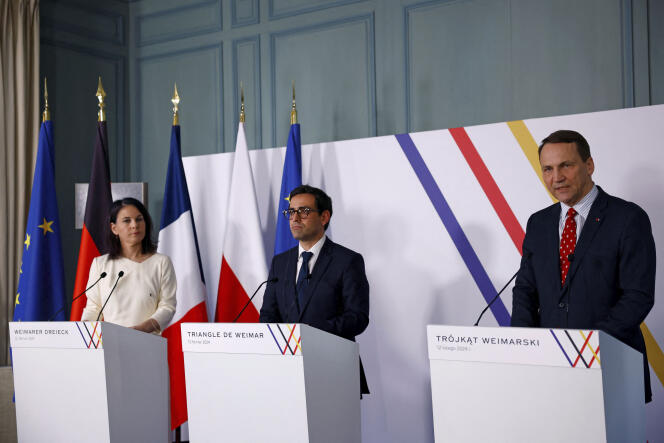


Almost two years after the start of Russia's invasion of Ukraine, French, German and Polish foreign ministers met in Paris on Monday, February 12, as part of the Weimar Triangle, the trilateral alliance between France, Germany and Poland. They were hoping to present a united front against Moscow, in support of Kyiv. A few hours after the French authorities revealed the existence of a network of sites called "Portal Kombat," set up to relay pro-Russian content in line with Kremlin propaganda, they pledged to work together to combat "Russian disinformation."
But above all, the Europeans had gathered to combat Donald Trump from a distance, after the former US president delivered a serious blow against NATO and European security. Running for re-election, Trump had declared the day before that he would "encourage" Russia to attack NATO member states if they did not increase their defense spending.
Trump's remark disrupted the visits first to Paris and then Berlin of Polish Prime Minister Donald Tusk on Monday. Tusk has been keen to revive relations with his European counterparts since coming to power in December 2023. The trip coincided with a meeting of the three countries' foreign ministers at the Château de La Celle-Saint-Cloud, outside Paris.
The leaders of the Weimar Triangle were obviously dismayed by the words of the Republican candidate, whose return to the White House they already fear. While Emmanuel Macron remained cautious, German Chancellor Olaf Scholz felt that "Any relativization of NATO's guarantee of assistance is irresponsible and dangerous." He added that "it is solely in Russia's interests," at a time when President Vladimir Putin is banking on Western fatigue in Ukraine. Ahead of his trips to Paris and Berlin, Tusk warned about the dangers of overly relying on the goodwill and availability of the US for Europe's defense, saying it could sooner or later end in catastrophe.
"The North Atlantic Alliance is not a contract with a security company," observed Radoslaw Sikorski from La Celle-Saint-Cloud. The head of Polish diplomacy recalled that Article 5 of the North Atlantic Treaty had only been activated once, after the September 11, 2001 attacks on the US. Poland had then committed itself to Afghanistan and "did not send the bill to Washington," he recalled, stressing that his country spent more than 3% of its GDP on defense and was therefore "entitled to be defended."
In the face of adversity, the three governments tried to close ranks. "Extraordinary times require extraordinary measures. Against this background, it is our goal to make the European Union more united, stronger and able to respond to today’s security challenges, on a path toward a security and defense union, living up to our citizen’s expectations. We are also committed to a strong and united NATO," the three foreign ministers said in a joint statement on Monday.
You have 50% of this article left to read. The rest is for subscribers only.
